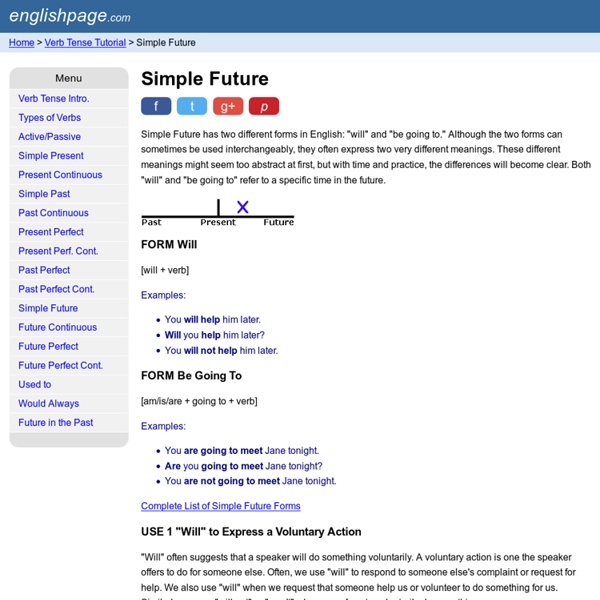Simple Future

Future Tenses in English - contrasted
Future Tenses will-future going to-future Simple Present Present Progressive Future Progressive Future Perfect Past Tenses in English - contrasted Present Tenses in English - contrasted Exercises 1) Use There is often very little difference between the future tenses. In newsapapers we often use the will-future, when the going to-future is used in oral communication. newspaper: The headmaster will close the old gym. oral: The headmaster is going to close the old gym. We can substitute the going to-future with the Present Progressive when using an expression of time. She is going to see Frank at the airport at 8.30. 2) Signal words There are no unambiguous signal words for the future tenses. 3) Form 4) Examples
English Grammar Explanations - Future tenses
There are several different ways in English that you can talk about the future. This page is an introduction to the most important ones: - Predictions/statements of fact - Intentions - Arrangements - Scheduled events Predictions/statements of fact The auxiliary verb will is used in making predictions or simple statements of fact about the future. The sun will rise at 6.30 tomorrow. Intentions The auxiliary verb going to is used in talking about intentions. We're going to buy a new car next month. Note: going to is often used in the past tense to talk about an unfulfilled intention. Arrangements The present continuous tense is used in talking about arrangements. I'm meeting my mother at the airport tomorrow.Our grandparents are visiting us this Christmas.Sorry, I can't stay after school today; I'm playing tennis with Jun-Sik.My sister's going to the dentist tomorrow.I'm not returning home for the holidays, so I can come to your party after all! Scheduled events Hurry up! More future tenses.
Future tenses of English verbs
Expressing the future time in English is particularly fraught with problems not only because there are so many different forms to choose from, but also because the distinction between them is not always clear. Will Form There should be no problem in making this particular form of the future tense since will does not change with the subject and the main verb is the form that you would find in a dictionary and so does not change either. Meanings This is the form that most people immediately associate with the future tense, but it is in fact restricted in its use. the first is to talk about unplanned or spontaneous future events; the second is for predictions that are not based on current evidence. Some examples should help to clarify the different meanings: (The telephone rings) I'll get it. I'll make us a cup of coffee. In these two cases the speaker is deciding what to do on the spur of the moment without prior consideration. I'll give you the money back next week. Going to MeaningsForm Meaning
The Future Tense
The future can be expressed in several ways in English. Here are the different possibilities: Future Simple: will + base form of the verbBe Going To: am, is, are + going to + base form of the verbShall: Shall + subject + base form of the verb? Time expressions in the Future Tense There are several time expressions that are used in all of the different forms of the future tense. Future Simple: Will + Base Form of the Verb This form is used to: Describe a simple action in the future: She‘ll write the e-mail after lunch.Alice won’t help us decorate for the party. Make a prediction or give a warning: Don’t lift that. Make a spontaneous decision: You dropped your purse. Contractions In general, use the contracted forms of the pronoun + will: I will > I’ll / he will > he’ll / she will > she’ll / you will > you’ll / we will > we’ll /they will > they’ll Ex. Yes/No Questions in the Future Simple Will Dave burn the CD for you? Wh- Questions in the Future Simple When will he give you an answer? Answers:
Related:
Related:



